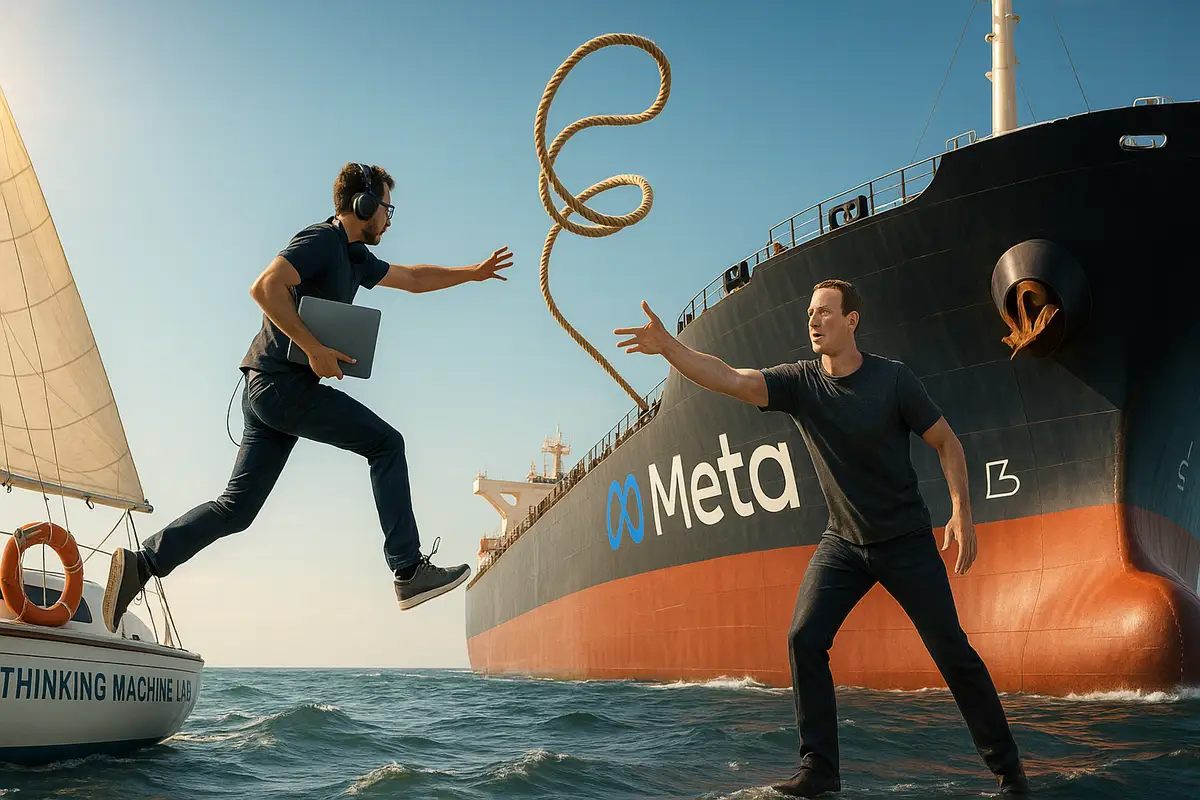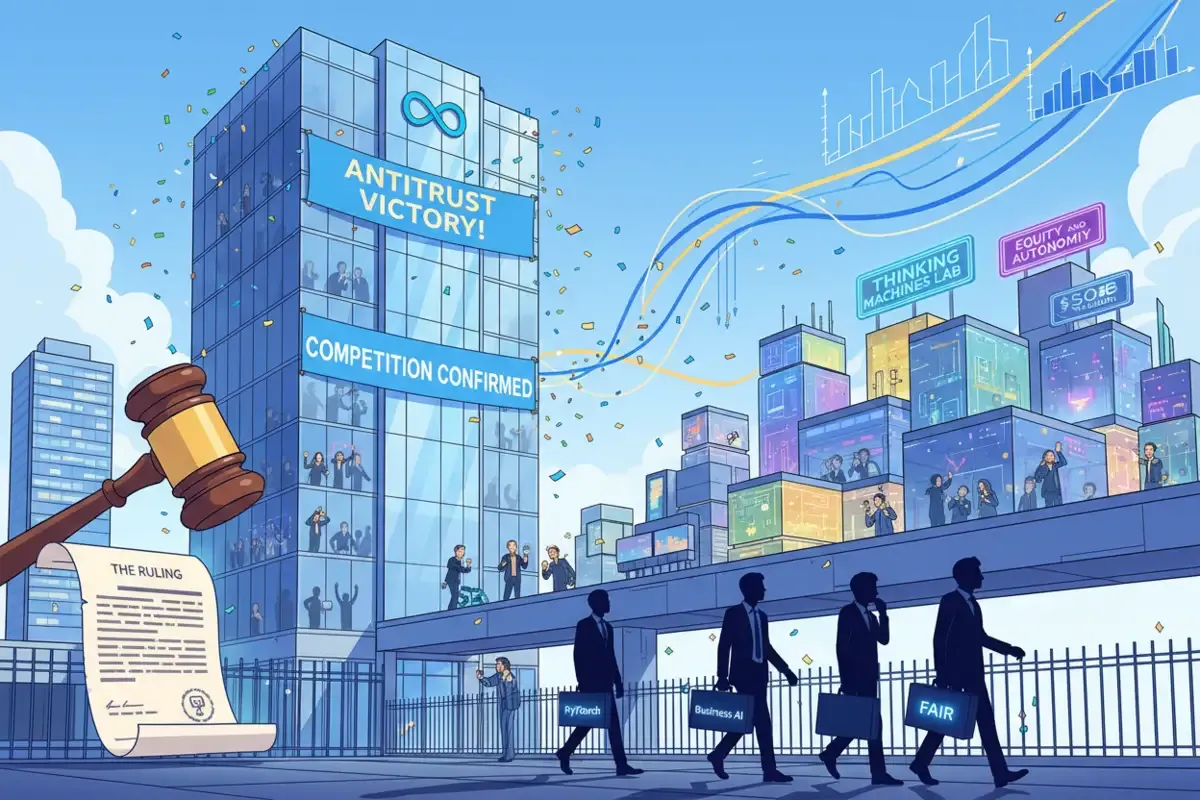Federal judges declared Meta faces "fierce competition" on Tuesday. The company's AI researchers apparently agree. They're just choosing to work for it instead.
Judge James Boasberg dismissed the FTC's five-year antitrust case against Meta, ruling the company no longer holds monopoly power in social networking. His 60-page decision cited TikTok and YouTube as legitimate competitors preventing Meta from dominating the market. "Meta is not a monopolist insulated from competition," Boasberg wrote, pointing to data showing users reallocate "massive amounts of time" away from Facebook and Instagram.
Same day, Soumith Chintala updated his LinkedIn profile. PyTorch's creator, one of the most influential AI frameworks in modern computing, announced he'd joined Mira Murati's Thinking Machines Lab. Fourth significant exit from Meta's AI ranks in recent weeks. Chief Revenue Officer John Hegeman left. Business AI head Clara Shih left. Chief AI scientist Yann LeCun is reportedly planning his departure.
Boasberg's ruling measures competition through consumer behavior. Where users spend time, which platforms they treat as substitutes, how much market share Meta commands. That framework says Meta operates in a fiercely competitive environment. Talent flow tells a different story about where actual competition happens. Meta's position looks weaker there.
The Breakdown
• Judge dismissed FTC's five-year case, ruling Meta doesn't hold monopoly power due to TikTok and YouTube competition
• PyTorch creator Chintala joined Thinking Machines Lab, fourth major AI departure alongside Hegeman, Shih, and reportedly LeCun
• Meta's stock fell 20% since October despite revenue beat, investors question $600 billion AI spending without talent retention
• Thinking Machines raised $2 billion at $10 billion valuation, now seeking $50 billion valuation before shipping any product
The Court's Logic Versus the Labor Market's Verdict
The FTC argued Meta shouldn't have been allowed to acquire Instagram for $1 billion in 2012. Or WhatsApp for $19 billion two years later. These deals eliminated competitors, the agency claimed, cementing Meta's monopoly in "personal social networking." That's the slice of social media focused on connections between friends and family.
Boasberg rejected this on empirical grounds. TikTok and YouTube aren't just video entertainment platforms anymore. Features have evolved nearly identical to Facebook and Instagram. Users treat them as substitutes. The four apps compete over a "meaningful share" of Meta's business. By total time spent, the measure Boasberg found most relevant, Meta's market share falls below 50 percent.
"The FTC's hypothesis about how people use these apps is consistently disproven by the data," Boasberg wrote. Meta now faces competition that has "forced" the company to "invest gobs of cash to keep up."
That last observation deserves scrutiny. Meta's cash investments haven't kept its people from leaving.
Chintala spent 11 years at Meta building PyTorch from scratch. Tool used "in production at virtually every major AI company," taught "in classrooms from MIT to rural India," according to his farewell message. PyTorch had reached stability. He wanted to try "something small, something new, something uncomfortable."
What he found: Thinking Machines Lab. Eight months old. Raised $2 billion at a $10 billion valuation in February. Now reportedly in talks to raise more at a $50 billion valuation. Technical salaries between $450,000 and $500,000 before bonuses and equity, H-1B filings show. More importantly, it's assembled John Schulman (co-led ChatGPT development), researcher Alec Radford, Bob McGrew (OpenAI's former Chief Research Officer).
Hegeman's exit carries different weight. Seventeen years at Meta, promotion to Chief Revenue Officer just last December. He announced he's leaving to start his own company. Details remain scarce, timing creates an uncomfortable juxtaposition. One day after the antitrust victory supposedly validating Meta's competitive strength.
Two Definitions of Competition, Two Different Conclusions
Antitrust framework examines market power through consumer harm. Does Meta's dominance let it raise prices or degrade service quality without losing users? Can potential competitors enter the market? Do substitutes exist?
By these measures, Boasberg found Meta constrained. TikTok's rise forced Meta to invest heavily in Reels. YouTube's reach pressures Instagram. Consumers switch platforms. Meta cannot behave like a monopolist because alternatives exist and users exercise choice.
This analysis captures one dimension of competitive dynamics. Misses another entirely.
AI talent market operates under different rules. Top researchers don't optimize for consumer preferences. They optimize for technical capability, autonomy, equity upside, the chance to work on frontier problems with other exceptional people. Meta competes not just for users' attention but for human capital that determines whether it can build products users will want five years from now.
That competition is fierce. Meta is losing.
LeCun's reported departure would represent the most significant blow. He founded FAIR, helped shape early infrastructure that made Meta a serious AI player. His decision to leave for his own startup signals something beyond typical executive turnover. The company's AI strategy or internal environment no longer provides what top researchers need.
Clara Shih's exit came after her father's unexpected death. Personal tragedy makes her departure understandable on human terms, timing compounds Meta's talent drainage at a moment when Business AI products are supposed to drive new monetization.
Broader pattern: Meta announced in November it would cut approximately 600 roles in its AI unit. Make the organization more agile. This restructuring, led by new Chief AI Officer Alexandr Wang (hired from outside), consolidated product and research functions. Streamlining can improve efficiency. Also tends to alienate researchers who value autonomy.
What the Market Thinks About Meta's Competitive Position
Meta's stock price tells its own story. Shares have fallen roughly 20 percent since the company reported third-quarter earnings in late October. Revenue beat expectations. Problem was guidance. Meta pledged to "meaningfully increase" spending in 2026 to pursue its AI strategy.
Investors absorbed this as bad news. Not because they doubt AI's importance, because they question whether Meta's massive capital expenditures will generate returns that justify the cost. Particularly when the company keeps losing the people who actually build AI systems.
Boasberg noted Meta has been "forced to invest gobs of cash to keep up" with TikTok and YouTube. Passive framing obscures agency. Meta chose to spend aggressively on AI infrastructure, data centers, compute capacity. Those investments require people who can turn hardware into products.
If talent continues flowing outward, cash investments matter less. You can't buy your way into AI leadership if researchers prefer working elsewhere.
The Competition That Matters Isn't Where the Judge Looked
Antitrust law focuses on market power as it affects consumers. Made sense when competitive advantage came from economies of scale, distribution networks, brand loyalty. Assets that compound over time and create durable barriers to entry.
AI introduces a different competitive dynamic. Talent is the scarce resource. Models are increasingly open source or easily replicated. Compute can be rented. The defensible moat, if one exists, comes from attracting and retaining researchers who can push capabilities forward faster than rivals.
Thinking Machines Lab demonstrates this explicitly. No shipping product generating revenue. Its valuation rests entirely on the people it's assembled and the assumption they'll build something valuable. Investors are betting $50 billion (at reported valuation) that Mira Murati, John Schulman, and now Soumith Chintala can create AI systems superior to what they'd build inside larger organizations.
That bet directly contradicts the notion that incumbents like Meta possess insurmountable advantages. Talent flow suggests startups offer something valuable that large companies struggle to provide. Autonomy, certainly. Equity upside, obviously. But also technical culture focused solely on advancing capabilities. Not navigating corporate politics, quarterly earnings pressure, advertiser concerns.
Meta can offer competitive salaries. Cannot offer freedom from Meta's baggage. Creates a structural disadvantage in talent competition that no amount of compute spending solves.
Zuckerberg's Trump Strategy and Internal Priorities
Mark Zuckerberg spent much of 2025 courting President Trump and his administration. Meta eliminated hate speech rules, dismantled external fact-checking, wound down diversity initiatives. Zuckerberg dined with Trump in September, seated directly beside the president. Boasted of plans to spend $600 billion in the US through 2028.
These moves aim to improve Meta's regulatory environment and positioning with the administration. May succeed politically. Also send signals internally about what the company prioritizes.
Researchers care about policy decisions for different reasons than executives do. Content moderation rollbacks and DEI program eliminations don't directly affect AI capability development, they shape perceptions about institutional values and where the company is headed. If your career options include working at Meta or joining a startup led by former OpenAI leadership, the company's political positioning might influence that choice.
Guy Rosen's role change fits this pattern. Led Meta's "integrity" work since shortly after the 2016 election. Handling issues from foreign influence campaigns to child exploitation content. Now he's moving to a position focused on incorporating AI into business operations. Handing integrity efforts to a deputy. Reorganization suggests Meta is deprioritizing the contentious work that defined post-2016 platform governance.
Business decision about resource allocation. Also a statement about what matters to leadership. Researchers read those statements.
The Verdict That Doesn't Settle Anything
Boasberg's ruling gives Meta legal clarity. The FTC cannot force divestiture of Instagram and WhatsApp. Five-year uncertainty is over. Meta can proceed without this particular regulatory threat hanging over strategy decisions.
What it doesn't provide: competitive advantage in the market that will determine Meta's position over the next decade. AI talent war is intensifying. Startups raising billions at multibillion-dollar valuations before shipping products. Compensation packages at established companies keep rising. Researchers can choose employers based on technical vision, not just money.
Meta faces genuine competition. Judge Boasberg measured it through user behavior, found TikTok and YouTube exert real pressure. Accurate as far as it goes. But the competition that determines whether Meta remains a dominant platform ten years from now is happening in talent markets, research capability, who can attract the people who push AI frontiers forward.
By that measure, Meta is struggling. PyTorch's creator just left. Chief Revenue Officer just left. Chief AI scientist is reportedly leaving. Business AI leadership left. These aren't typical departures from a company with insurmountable competitive advantages.
FTC lost its case arguing Meta holds monopoly power. Researchers leaving Meta seem to agree. The company doesn't have monopoly power over their careers. They're voting with their feet, choosing to compete against Meta rather than for it.
That's what fierce competition looks like. Just not the kind the court was measuring.
Why This Matters
For Meta investors: Legal victory resolves one uncertainty while exposing another. Regulatory risk from Instagram/WhatsApp acquisitions has diminished. Talent retention risk is accelerating. The $600 billion spending commitment through 2028 depends on having people who can convert capital into capability. If researchers continue leaving, investment thesis weakens regardless of legal standing.
For the AI industry: Talent mobility has become the primary competitive mechanism. No company can prevent top researchers from leaving for startups offering better equity and autonomy, regardless of size or resources. This alters competitive dynamics compared to previous technology cycles where distribution or data created durable moats. Defensible advantages are narrowing toward pure technical execution. Requires keeping exceptional people who have growing numbers of options.
For regulators: Antitrust frameworks built around market share and consumer behavior may miss the competition that matters most in AI development. If the strategic asset is talent rather than user bases, cases focused on historical acquisitions become backward-looking exercises. Question isn't whether Meta's purchase of Instagram created monopoly power in social networking. Question is whether any company can maintain sustained leadership when researchers can leave for startups raising billions overnight.
❓ Frequently Asked Questions
Q: What is PyTorch and why does Chintala's departure matter?
A: PyTorch is an open-source AI framework that virtually every major AI company uses in production. Meta developed it internally starting in 2017. Chintala spent 11 years building it into the infrastructure layer that powers modern AI development, taught in classrooms from MIT to rural India. His departure signals Meta is losing architects of its core AI foundations.
Q: How do Thinking Machines Lab salaries compare to Meta's?
A: Thinking Machines offers $450,000 to $500,000 base salaries for technical roles according to H-1B filings, before bonuses and equity. Meta's senior AI researchers typically earn $400,000 to $600,000 total compensation. The real difference is equity upside. Thinking Machines' reported $50 billion valuation gives early employees potentially massive returns that Meta's $1.5 trillion market cap cannot match.
Q: What is "personal social networking" that the FTC focused on?
A: The FTC defined it as platforms where users primarily connect with friends and family they already know, sharing life updates and personal content. This excludes video entertainment platforms, professional networks like LinkedIn, or anonymous forums like Reddit. The agency argued Meta monopolized this specific category, distinct from broader social media that includes entertainment and discovery.
Q: Why did the judge originally dismiss this case in 2021?
A: Judge Boasberg ruled in 2021 that the FTC didn't provide enough evidence that Facebook held market power. The agency's original complaint lacked specific user numbers and competitive metrics. The FTC refiled in August 2021 with detailed data about Meta's usage relative to competitors like Snapchat and the now-defunct Google+, which allowed the case to proceed in 2022.
Q: What "integrity" work is Guy Rosen stepping away from?
A: Rosen led Meta's efforts against foreign influence campaigns, election misinformation, child exploitation content, hate speech, and coordinated inauthentic behavior since shortly after the 2016 election. His team built systems to detect and remove harmful content, managed relationships with governments demanding takedowns, and handled platform governance decisions. This work drew constant political criticism from both parties claiming bias.

















